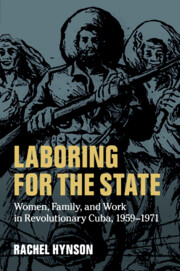Book contents
- Laboring for the State
- Cambridge Latin American Studies
- Laboring for the State
- Copyright page
- Dedication
- Contents
- Figures
- Acknowledgments
- Abbreviations
- Introduction
- 1 In the Hands of Physicians
- 2 “The husband must protect the wife and the latter obey the husband”
- 3 From the Streets to the Home
- 4 The Elasticity of Truth
- Epilogue
- Bibliography
- Index
- Series page
3 - From the Streets to the Home
The Reeducation and Resistance of Female Prostitutes
Published online by Cambridge University Press: 09 January 2020
- Laboring for the State
- Cambridge Latin American Studies
- Laboring for the State
- Copyright page
- Dedication
- Contents
- Figures
- Acknowledgments
- Abbreviations
- Introduction
- 1 In the Hands of Physicians
- 2 “The husband must protect the wife and the latter obey the husband”
- 3 From the Streets to the Home
- 4 The Elasticity of Truth
- Epilogue
- Bibliography
- Index
- Series page
Summary
The program to eliminate female prostitution (1959–1966) is the subject of Chapter 3, which examines the broad negotiation that occurred amongst revolutionary representatives, leadership, and prostitutes themselves, all of whom made claims to women’s bodies and labor. The chapter also argues that regional reformers helped initiate the anti-prostitution campaign, operating freely and without state support until 1962, when the Ministry of the Interior assumed greater control. These revolutionary representatives adopted a flexible definition of prostituta, one that allowed them to target for reform the behavior and labor of all Cuban women. Furthermore, the methods for reforming these women were premised on a belief in the superiority of elite, white cultural norms and contrasted with the more repressive methods for reforming marginalized men, at least until 1966. During the five years of the campaign, this chapter shows, the government transitioned from viewing prostitutes as victims of capitalism to “criminal manifestations” who rejected the Revolution’s economic opportunities. When Fidel announced the successful end of the campaign in 1966, his pronouncement overlooked the persistence of prostitution and the continued resistance of women who challenged government claims that citizenship was to be earned by subverting economic autonomy to the state (or to their husbands).
Keywords
- Type
- Chapter
- Information
- Laboring for the StateWomen, Family, and Work in Revolutionary Cuba, 1959–1971, pp. 149 - 200Publisher: Cambridge University PressPrint publication year: 2020

